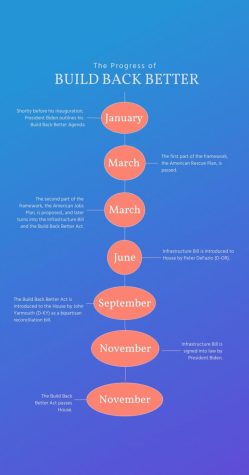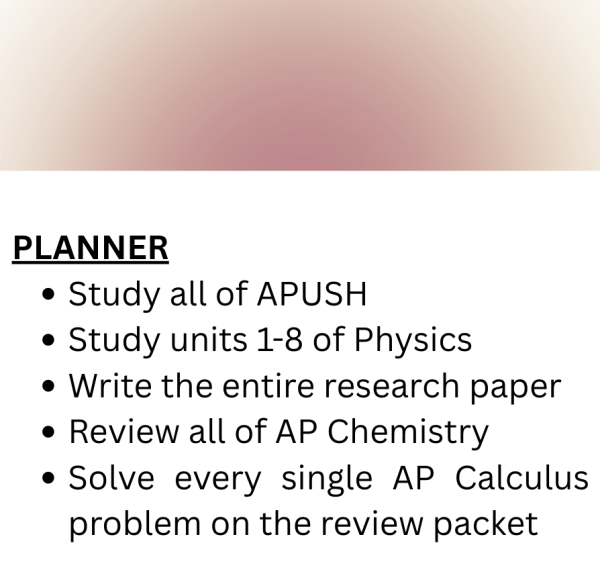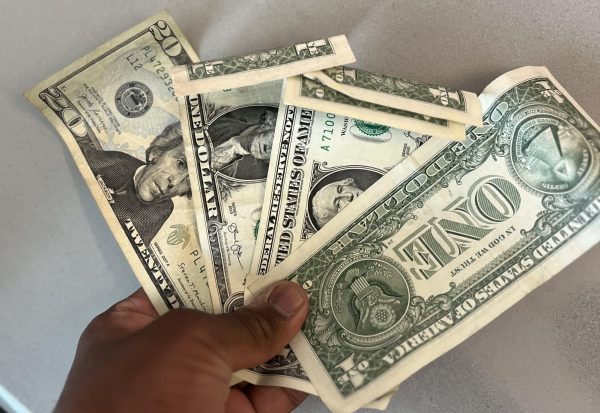Op-Ed: Build Back Better: It May Not Be The Perfect Bill, But It’s The One College Students Need
If debt forgiveness, college grants, and free community college is not included in the Build Back Better Plan, then generations of students, like ourselves, will start our adults lives in mounds of debt.
This fall in the college search process, I was torn between two choices: staying in my home state Texas, where I am comfortable, or exploring a new path out of state, where I will be exposed to more opportunities. As a first-generation middle income college student, this is a monumental step for me in my education. The most significant factor in this decision is the cost. Under President Biden’s administration, one of the early promises was that there would be more scholarships and reduced college costs for students like me. These were outlined in the Build Back Better Act, but this act has since been chipped away and deadlocked in Congress.
The Build Back Better Act is still in the House, and many of its provisions to students have been cut due to a cut in the bill’s budget. Proposed initially on Biden’s campaign trail, the plan also included investment in caregiving, climate change, health care, and assistance for the middle class. In regards to students, there would be free community college, increased pell grants, loan cancellation, more access for DREAMers – undocumented immigrants brought to the United States as children. Key figures supporting this bill include Senate Majority Leader Chuck Schumer (D-NY) and Sen. Elizabeth Warren (D-MA). Furthermore, moderate Democrats, like Joe Manchin (D-WV), will be crucial in the final resolution. Sadly, several elements, including free community college, have already been cut. This would have been a direct path to higher education for many students. Low and middle-income students often consider enrolling in two years of community college followed by two years at an accredited four-year college. It relieves financial stress, while still allowing them to go to college. Although this is not my first option, it would have been reassuring to have another safety choice in my back pocket.
Student loans are a massive burden for former students, so that loan cancellation would have been extremely helpful to their careers and financial security. Biden mentioned that the administration would support up to $10,000 of loan forgiveness. However, the most recent legislation excludes any mention of loan forgiveness. A number of Democratic lawmakers are urging President Biden to reconsider his decision to restart federal student loan payments in February. The loans were suspended for nearly two years due to the pandemic.
A growing number of Democrats have backed debt cancellation of up to $50,000 per borrower. California Congressmember Ro Khanna said failing to act on student loans could harm Democrats in the midterms, and tweeted Wednesday, “Resuming student loan payments … could hurt our economic recovery and the effectiveness of the American Rescue Plan. Canceling student loan debt for the working and middle class isn’t just the right thing to do – it’s good policy.”
In its current state, the bill promises to increase the Pell grants by at least $550 for most students, to invest in many colleges serving underprivileged and minority groups, and make it easier for most people to earn degrees. It also promises that investing in infrastructure and climate change will create more jobs for Americans and help college graduates find more opportunities. Many of the elements are defined only vaguely, and it is unclear how the policymakers will accomplish the goals they outlined. Still, an economy recovering from the state of turmoil brought by the pandemic, like the United States, requires investment, and high-profile economists like Paul Krugman support the deficit and the Infrastructure bill.
Arguments against this bill, the Infrastructure Bill, and the deficit are illogical, because although the deficit can have consequences in the long run, according to the Build Back Better Framework website, the framework will be paid for largely by ensuring that wealthy corporations and individuals pay taxes, by closing loopholes that allow them to avoid taxes and by investing in existing tax laws. The bill proposes new legislation that would include a 5% tax rate on incomes above $10 million, as well as ensuring that America’s wealthy pay the 3.8% Medicare tax. A bill that not only invests in education, healthcare, childcare, and immigration reform, but also in closing the wealth gap is truly exceptional. The level of ambition and idealism in this bill, and the associated infrastructure bill, makes them unique and worth supporting. Anything that was cut out of these bills because of political opposition or budget cuts should be reincluded and passed along with this act, because clearly, the benefits of Build Back Better will outweigh the costs in the long run. This bill, by investing in education and healthcare, will not only create jobs, but also ensure long-run economic growth.
The Infrastructure bill, which faced the same bipartisan concerns about the deficit the Build Back Better Act is facing, has already been passed, with support from leading economists like Paul Krugman. The government needed to spend money to create new jobs after many people were left unemployed during the pandemic. Additionally, interest rates are low enough that the economy could handle a rise in interest rates after the spending. Because of this, any cost of aiding people with the Build Back Better Framework is outweighed by the benefits, and this policy. We need to pass the Build Back Better plan and continue to fight for more aid for college students, so that young students like me can go to college.
This fall in the college search process, I was torn between two choices: staying in my home state Texas, where I am comfortable, or exploring a new path out of state, where I will be exposed to more opportunities. As a first-generation middle income college student, this is a monumental step for me in my education. The most significant factor in this decision is the cost. Under President Biden’s administration, one of the early promises was that there would be more scholarships and reduced college costs for students like me. These were outlined in the Build Back Better Act, but this act has since been chipped away and deadlocked in Congress.
The Build Back Better Act is still in the House, and many of its provisions to students have been cut due to a cut in the bill’s budget. Proposed initially on Biden’s campaign trail, the plan also included investment in caregiving, climate change, health care, and assistance for the middle class. In regards to students, there would be free community college, increased pell grants, loan cancellation, more access for DREAMers – undocumented immigrants brought to the United States as children. Key figures supporting this bill include Senate Majority Leader Chuck Schumer (D-NY) and Sen. Elizabeth Warren (D-MA). Furthermore, moderate Democrats, like Joe Manchin (D-WV), will be crucial in the final resolution. Sadly, several elements, including free community college, have already been cut. This would have been a direct path to higher education for many students. Low and middle-income students often consider enrolling in two years of community college followed by two years at an accredited four-year college. It relieves financial stress, while still allowing them to go to college. Although this is not my first option, it would have been reassuring to have another safety choice in my back pocket.
Student loans are a massive burden for former students, so that loan cancellation would have been extremely helpful to their careers and financial security. Biden mentioned that the administration would support up to $10,000 of loan forgiveness. However, the most recent legislation excludes any mention of loan forgiveness.
In its current state, the bill promises to increase the Pell grants by at least $550 for most students, to invest in many colleges serving underprivileged and minority groups, and make it easier for most people to earn degrees. It also promises that investing in infrastructure and climate change will create more jobs for Americans and help college graduates find more opportunities. Many of the elements are defined only vaguely, and it is unclear how the policymakers will accomplish the goals they outlined. Still, an economy recovering from the state of turmoil brought by the pandemic, like the United States, requires investment, and high-profile economists like Paul Krugman support the deficit and the Infrastructure bill.
Arguments against this bill, the Infrastructure Bill, and the deficit are illogical, because although the deficit can have consequences in the long run, according to the Build Back Better Framework website, the framework will be paid for largely by ensuring that wealthy corporations and individuals pay taxes, by closing loopholes that allow them to avoid taxes and by investing in existing tax laws. The bill proposes new legislation that would include a 5% tax rate on incomes above $10 million, as well as ensuring that America’s wealthy pay the 3.8% Medicare tax. A bill that not only invests in education, healthcare, childcare, and immigration reform, but also in closing the wealth gap is truly exceptional. The level of ambition and idealism in this bill, and the associated infrastructure bill, makes them unique and worth supporting. Anything that was cut out of these bills because of political opposition or budget cuts should be reincluded and passed along with this act, because clearly, the benefits of Build Back Better will outweigh the costs in the long run. This bill, by investing in education and healthcare, will not only create jobs, but also ensure long-run economic growth.
The Infrastructure bill, which faced the same bipartisan concerns about the deficit the Build Back Better Act is facing, has already been passed, with support from leading economists like Paul Krugman. The government needed to spend money to create new jobs after many people were left unemployed during the pandemic. Additionally, interest rates are low enough that the economy could handle a rise in interest rates after the spending. Because of this, any cost of aiding people with the Build Back Better Framework is outweighed by the benefits, and this policy. We need to pass the Build Back Better plan and continue to fight for more aid for college students, so that young students like me can go to college.

[/sidebar]
Your donation will support the student journalists of Carnegie Vanguard High School. Your contribution will allow us to cover our annual website hosting costs and fund field trips, competition fees, and equipment. We appreciate your support!

Hello Rhinos! My name is Sarah Fernandez and I am a Senior (22'). I love to read non-fiction especially concerning the fashion world and bibliographies....

I love reading, learning, drawing cartoons, watching films, and discussing art, history, politics, and business. I also collect historical artifacts,...






